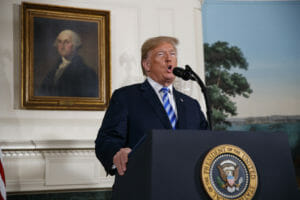‘Homeland Security USA’: The Outtakes
The inaugural episode of ABC's newest reality television series did exactly as producer Arnold Shapiro told viewers it would: unabashedly celebrated the Department of Homeland Security. It also failed in every conceivable way to critically examine the largest reorganization of the federal government since World War II.
Note: G.W. Schulz is working on a project at the Center for Investigative Reporting about homeland security in the United States, “America’s War Within,” which can be found here
.
The inaugural episode of ABC’s newest reality television series did exactly as producer Arnold Shapiro told viewers it would: unabashedly celebrated the Department of Homeland Security. It also failed in every conceivable way to critically examine the largest reorganization of the federal government since World War II.
“Homeland Security USA” is the latest iteration of reality TV that like the show “Cops” romanticizes actual working police catching bad guys, except that now the cops aren’t just snagging small-time drunks and corner crack dealers. They’re federal agents from the Department of Homeland Security with far greater power using the latest technology to keep America safe from terrorists and stop international organized criminals from trafficking massive quantities of narcotics into the United States.
Shapiro received full access with his camera teams to nearly every agency folded into the Department of Homeland Security when it was created in 2003, from the Coast Guard to Customs and Border Protection, an access that no investigative journalist ever could attain. But he made a deal with the devil in exchange that would cause any journalism ethics professor to blush in embarrassment. Shapiro agreed to grant the department “pre-screening” rights over the series, according to The New York Times.
Missing, then, from the Jan. 6 premiere — and presumably from future episodes — are allegations like those unearthed by journalists and other watchdogs that some federal air marshals, for example, have accepted bribes, trafficked cocaine themselves and even sought to have a woman killed in one stupefying instance. There is nothing like the reports of border agents taking luxury cars as payment for secretly allowing illegal immigrants to cross into the United States. Not included either is any reference to the innumerable accounts from government overseers of dubious multimillion-dollar technology investments made by the department that were later abandoned after being deemed worthless.
Law enforcement bureaucrats featured in “Homeland Security USA” instead are cast as motivated not by the reliability of a government paycheck and an otherwise limitless federal budget with which to purchase new toys that frequently fail but by a simple desire to protect American families from the world’s ghastly horrors.
“I love investigative journalism, but that’s not what we’re doing,” Shapiro told The Hollywood Reporter in May. “This show is heartening. It makes you feel good about these people who are doing their best to protect us.”
By no means do the American people begrudge law enforcement officials doing their jobs. Quite the opposite. They want police heroes to maintain the highest professional standards possible and for serious lawbreakers to be placed behind bars.
So it’s indeed disheartening to realize that what some of the best news stories published and aired in recent years showed was the many ways in which the Department of Homeland Security has actually failed to protect America’s borders and keep dangerous criminals off jet airliners, disconcerting truths that clash spectacularly with Shapiro’s own take on reality, which ABC officials say will span 13 episodes.
For instance, a partnership between the journalism nonprofit ProPublica and USA Today published in November revealed that the Air Marshal Service, dramatically expanded after 9/11, contained in its ranks at least 18 people charged with felonies.
One air marshal was hired despite at the time being under FBI investigation for skimming drug profits while working as a sheriff’s deputy in Arkansas. Another allegedly sneaked cash and cocaine past airport security. Yet another allegedly tried to hire someone to murder his wife. Other marshals had been fired from past law enforcement positions for misconduct but were hired by the Department of Homeland Security anyway.
According to the story: “Since 9/11, air marshals have taken bribes, committed bank fraud, hired an escort while on layover and doctored hotel receipts to pad expenses, records show. They’ve been found sleeping on planes and lost the travel documents of U.S. diplomats while on a whiskey-tasting trip in Scotland.”
The show’s first episode, titled “This Is Your Car on Drugs,” focuses on the exploits of Customs and Border Protection. In one segment, a young woman arrives from Switzerland at the Los Angeles International Airport “with no working papers but a suitcase full of titillating surprises!” ABC described it in advanced press copy sent out before the show aired. She had revealing apparel in her suitcase, we learned during the Jan. 6 airing.
Meanwhile, the department’s inspector general discovered something else at LAX in October. Computer systems there managed by homeland security officials are susceptible to cyber attack because they’re poorly guarded, according to a report. One data system maintained by the Transportation Security Administration allowed anonymous access, which meant a hacker could log on without proper credentials. In another incident, customs authorities installed high-speed wireless Internet access at the airport for their use, but it was hampered by technical problems and no one could say after a full year whether it had ever actually worked.The report pointed to a 2007 incident in which customs officials suffered a major network outage at LAX that halted operations for hours and disrupted the travel of thousands, stranded on the airport’s tarmac and elsewhere. An aging IT infrastructure apparently exacerbated the problem.
In another segment of the show, Border Patrol officials inspect vehicles at the southwest border and execute a drug bust while cameras are rolling. Multiple large packages of marijuana spill out of the spare tire and gas tank of the car as border agents grin broadly nearby. Later at Washington state’s border with Canada, 77 pounds of cocaine are found stuffed inside baby diapers after Shapiro’s protagonists grow suspicious of a Ford Explorer.
“The money that funds narcotics also funds terrorism, and the more of that we can stop, the better,” one agent tells America following the seizure.
But when reporters Lowell Bergman and Andrew Becker teamed up for a project with Frontline/World and The New York Times last May, they found that there were roughly 200 open corruption investigations at three major homeland security components with border responsibilities: Customs and Border Protection, Immigration and Customs Enforcement (ICE) and Citizenship and Immigration Services.
The journalists (one a Center for Investigative Reporting co-founder and the other currently a staff reporter) profiled nine customs officers and border agents who’d been arrested between 2005 and 2008. Two of them, brothers named Raul and Fidel Villareal, disappeared for several months while under investigation before being captured in Tijuana last October and charged with smuggling Mexicans and Brazilians into the United States, using a government-issued vehicle to transport illegals to San Diego and laundering money.
Another man, Michael Gilliland, admitted receiving between $70,000 and $120,000 in bribes to wave cars piloted by smugglers through his inspection lane unmolested. A former Marine who joined the Department of Homeland Security is believed to have taken as much as $80,000 in such bribes. Others sprung detainees from ICE detention facilities.
One FBI agent told Becker and Bergman: “There’s more pressure on the other side of the border from the smuggling organizations to elicit the help of a corrupt border official. The pool of individuals who are susceptible to corruption has grown.”
Becker then reported for the Times in November that police arrested a veteran customs inspector in Del Rio, Texas, for allegedly helping to smuggle 3,000 pounds of cocaine into the United States over five years. Media outlets in Texas all but missed the story because the press release announcing his indictment sent out by the regional U.S. attorney’s office neglected to mention the man was an employee of the Department of Homeland Security. But a standard note at the bottom disclosing that the department’s inspector general was involved in the probe provided a crucial tip. The customs officer also is accused of accepting $30,000 to falsify a passport application.
As producer Shapiro resides in an editing room melding together rapid-fire segments of brilliant television that portrays law enforcement technology as infallible and witless criminals and terrorists as sure to be caught, others have filed Freedom of Information Act requests, studied little-noticed congressional reports and interviewed disenchanted whistle-blowers to show that while the multibillion-dollar Department of Homeland Security does protect America from the world’s dark side, it also persists as a sinkhole for taxpayer dollars and a revolving door for government executives who turn their civil service jaunts into lucrative private-sector careers.
U.S. News & World Report in 2005 described the seamless transition for top homeland security officials to corporate positions. Just before Tom Ridge took over as head of the new agency, two of his top aides joined a lobbying firm that represents major homeland security contractors, including Boeing and BearingPoint. At least six others with big titles at the department, including Ridge himself, who eventually joined the board of a firm developing security technology, made similar moves.
We probably won’t learn it from “Homeland Security USA,” but the department is continually battered by corruption, including reports in 2007 that former FEMA officials charged the federal government double what their private consulting firms paid for subcontracted employees during the Hurricane Katrina cleanup, rates they insisted were “industry standard.”
In fact, the first episode didn’t touch the department’s heavy reliance on private contractors, which made up a whole 40 percent of its activities last year.
Then there are the department’s widespread problems with mismanagement. In one extraordinarily ironic case, homeland security officials had to totally scrap a $52 million computer system that was supposed to better enable it to manage an annual budget of approximately $50 billion. The department had originally intended to spend $229 million creating the failed eMerge2 program. There was “little to show for it” despite the amount already poured into the system, according to one Government Accountability Office report.
Like the once wildly popular reality show “Cops,” Shapiro threatens to create the false impression that police are not vulnerable to corruption or breaking the law to enforce it and that the law enforcement lobby in the United States always acts in the best interests of the American people and their taxpayer dollars.It would be equally false to assume that investigative journalism, which asks tough questions of the department, is intended to disrespect those who work in law enforcement or to be sympathetic of criminals who illegally move dangerous weapons in and out of the country, engage in human trafficking of sex victims or further destroy America’s inner cities with powerfully addictive drugs.
The New York Times called “Homeland Security USA” a “recruitment video,” and The Washington Post piled on, dismissing it as “a sorry excuse for a television show.”
Either way, the television medium won’t be used this time to share with the public a reality of the department’s many colossal mistakes and stumbles. So details of them remain tucked away in mile-high stacks of reports from the GAO and inspector general awaiting exposure by the more curious among us.
G.W. Schulz is working on a project at the Center for Investigative Reporting about homeland security in the United States, “America’s War Within,” which can be found here.
Your support matters…Independent journalism is under threat and overshadowed by heavily funded mainstream media.
You can help level the playing field. Become a member.
Your tax-deductible contribution keeps us digging beneath the headlines to give you thought-provoking, investigative reporting and analysis that unearths what's really happening- without compromise.
Give today to support our courageous, independent journalists.






You need to be a supporter to comment.
There are currently no responses to this article.
Be the first to respond.